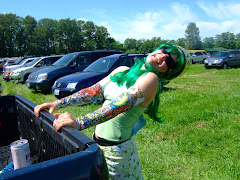 It's almost not entirely a coincidence that I'm writing about Where Men Win Glory: The Odyssey of Pat Tillman by Jon Krakauer on (or around) Veteran's Day. I would be writing about it anyway, eventually, so why not now? Even though I'm not quite done reading it, it's well worth recommending, and far more appropriate for a solemn national holiday than the other two books I just read, one entitled How Sex Works and the other a young adult novel in which the plot hinges on a scene where the narrator craps his pants.
It's almost not entirely a coincidence that I'm writing about Where Men Win Glory: The Odyssey of Pat Tillman by Jon Krakauer on (or around) Veteran's Day. I would be writing about it anyway, eventually, so why not now? Even though I'm not quite done reading it, it's well worth recommending, and far more appropriate for a solemn national holiday than the other two books I just read, one entitled How Sex Works and the other a young adult novel in which the plot hinges on a scene where the narrator craps his pants.If you're unfamiliar with the story, Pat Tillman was a professional football player who, following the 9/11 attacks, gave up his $3 million contract and joined the Army with his younger brother, Kevin. The two trained together and became members of an elite force, were sent to Afghanistan, and Pat Tillman was killed. Investigations into his death revealed that he had been accidentally shot by an American soldier and that the incident was covered up by the military.
Krakauer has a talent for delving deep into the backstory when he writes; Into Thin Air, Into the Wild, and Under the Banner of Heaven all provided thorough examinations not only of the individuals he wrote about, but the circumstances and politics surrounding their situations. His story of Pat Tillman's life and death is no different. Krakauer begins with an explanation of the conflict in Afghanistan, including the formation of the Taliban, that involved a lot of names and words that are really hard to spell and pronounce and which I will never remember. However, it did provide me with a better understanding of why the U.S. got involved.
The best parts of the book, however (and probably the reason most people will read it) are the details about Pat Tillman, his life and personality, and his almost unfathomable decision to give up his life's dream to go to war. Tillman was, as Krakauer clearly illustrates, a charismatic, intelligent and sometimes inscrutable character who doesn't fit the NFL stereotypes. Details about his life come mainly from his widow, Marie Tillman, who worked closely with Krakauer in writing the story and who continues to do work in memory of Pat Tillman.
I haven't finished reading Where Men Win Glory yet. I'm stuck on the portion about the Tillmans' relationship, their deep love for one another, and the affection that Pat Tillman wrote about regularly in letters to Marie and his own journals. The tragedy of his death is magnified by this fully realized portrait of who Pat Tillman was not just unto himself, but in the lives of those who were deeply affected by his charisma, humor, intelligence, and eventually, his death.



 Songs for the Missing by Stewart O'Nan
Songs for the Missing by Stewart O'Nan































